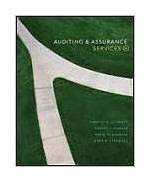Upon publication, this
text will be the most up-to-date auditing text on the market. It's been written so that it
is current with all issues inherent in accounting and auditing practice, particularly in
public accounting firms including coverage of the creation of the Public Companies
Accounting Oversight Board, the passage of the Sarbanes-Oxley Act, and all of the major
pronouncements and exposure drafts issued by the AICPA through Summer 2003. It's also a
leader in fraud coverage and is accompanied by the Apollo Shoes Casebook, the only
standalone FRAUD audit case on the market (available online on the text website). The text
is also designed to provide flexibility for instructors; the twelve chapters focus on the
Auditing Process while the eight modules provide additional topics that can be taught at
the instructors' discretion without interrupting the flow of the text.
KEY FEATURES
Real world emphasis in the text with discussion of wealth of companies with which students
are familiar, including AOL TimeWarner, Compaq Computer, Disney, Hewlett-Packard, and
Wal-Mart. Fraud awareness emphasis throughout text by inclusion of FRAUD cases in EACH
chapter pulled from recent headlines-including companies such as Phar-Mor, Enron, Critical
Path, World Com. Fraud awareness emphasis through 3 specific chapters/modules: Chapters 3:
Management Fraud and Auditor Risk Chapter 6: Employee Fraud and the Audit of Cash Module D
focuses on the Certified Fraud Exam The Apollo Shoes Case is now offered on the Louwers
1/e Online Learning Center, under Premium Content. This is the only standalone fraud audit
case on the market. While the text still refers to Apollo Shoes, the online availability
allows students freedom to use the case independent of the text and does not interrupt the
narrative of the chapter. Discussion of the creation of the Public Companies Accounting
Oversight Board (PCAOB) and its standard-setting and monitoring roles. Coverage of all of
the major pronouncements and exposure drafts issued by the AICPA through Summer 2003.
Discussion of the passage of the Sarbanes-Oxley Act of 2002. End of chapter materials
include electronic workpapers that send students to the text website to work problems that
mimic those on the New Uniform CPA Exam. Integrated coverage of assurance services,
reflecting the ever-expanding market for assurance services. For example, in Module E:
Overview of Sampling, the authors explain an assurance engagement performed to measure
claims by a golf ball manufacturer that their golf ball provides increased distance. Where
applicable, each chapter discusses how the concepts and issues discussed in that chapter
affect assurance engagements, recognizing the increasingly different and complex
situations in which CPAs are requested to provide assurance on varying types of
information. Real world examples of employee fraud including a copy of an actual altered
bank statement. Introduction covers the McKesson & Robbins fraud that lead to the
creation of generally accepted auditing standards. Integration of GAAS into the phases of
the audit. Increased coverage of business process measurement and risk based auditing.
Coverage of COSO's new Enterprise Risk Model. Chapter 4 introduction discusses of Andersen's
planning of the Enron engagement. All supplements written by the author team.
Table of Contents
CHAPTER 1: Auditing and Assurance Services
CHAPTER 2: Professional Standards
CHAPTER 3: Management Fraud and Audit Risk
CHAPTER 4: Engagement Planning
CHAPTER 5: Internal Control Evaluation: Assessing Control Risk
CHAPTER 6: Employee Fraud and the Audit of Cash
CHAPTER 7: Revenue and Collection Cycle
CHAPTER 8: Acquisition and Expenditure Cycle
CHAPTER 9: Production and Payroll Cycle
CHAPTER 10: Finance and Investment Cycle
CHAPTER 11: Completing the Audit
CHAPTER 12: Reports on Audited Financial Statements
850 pages


